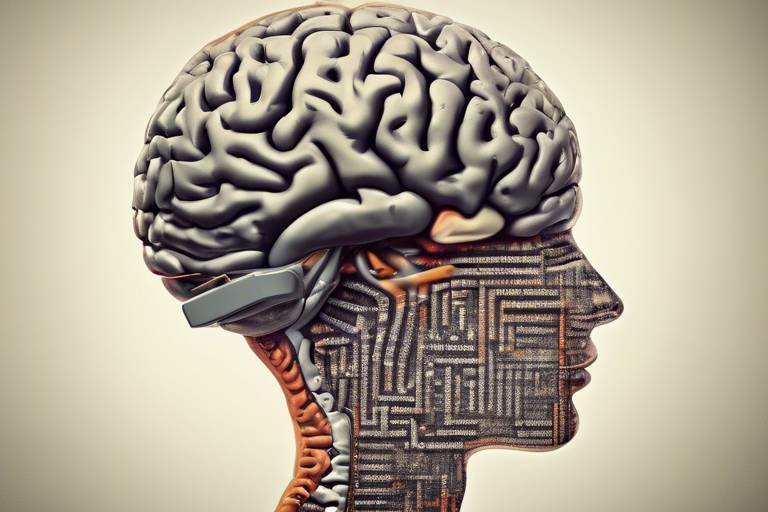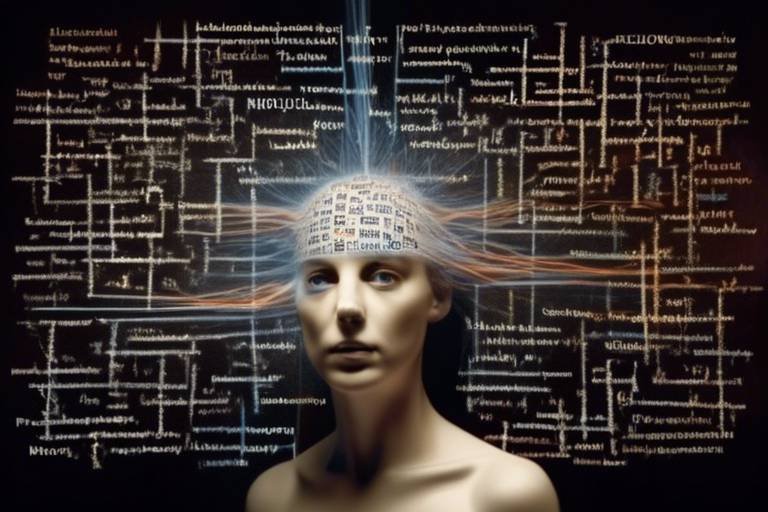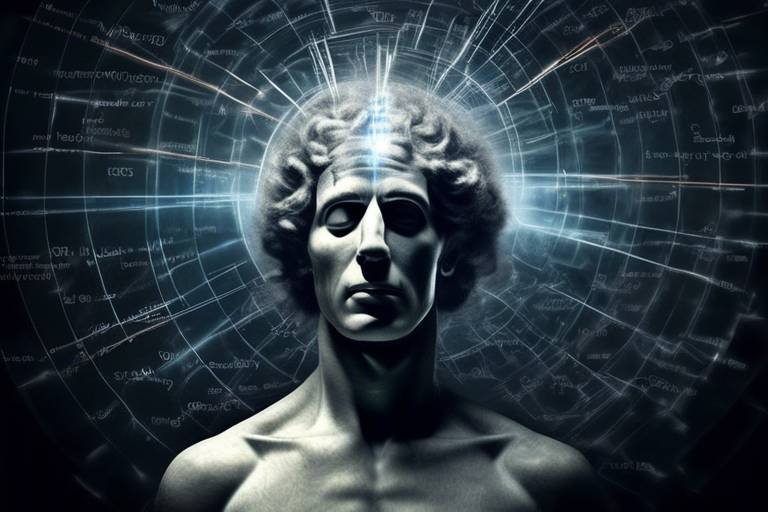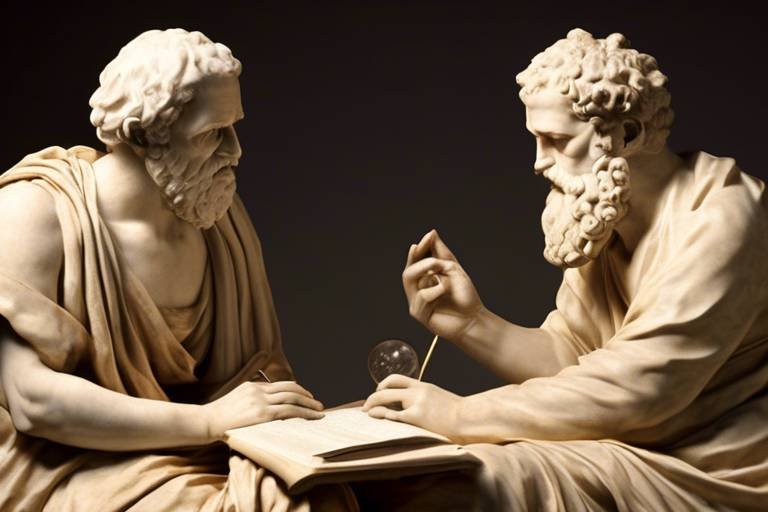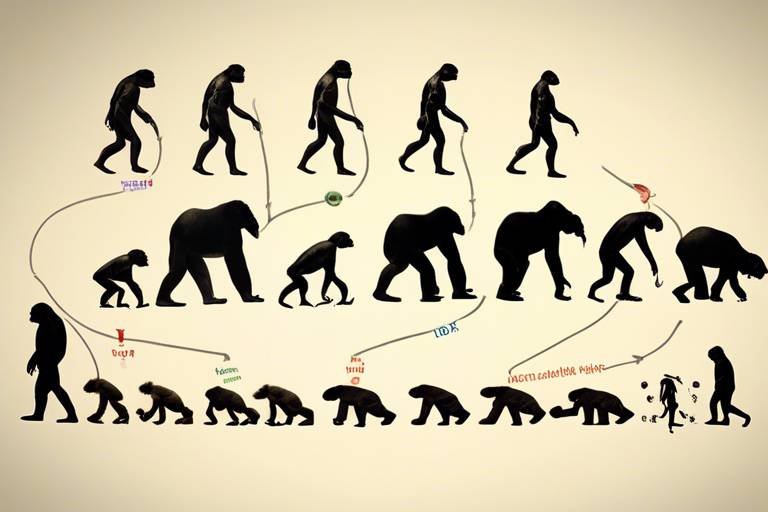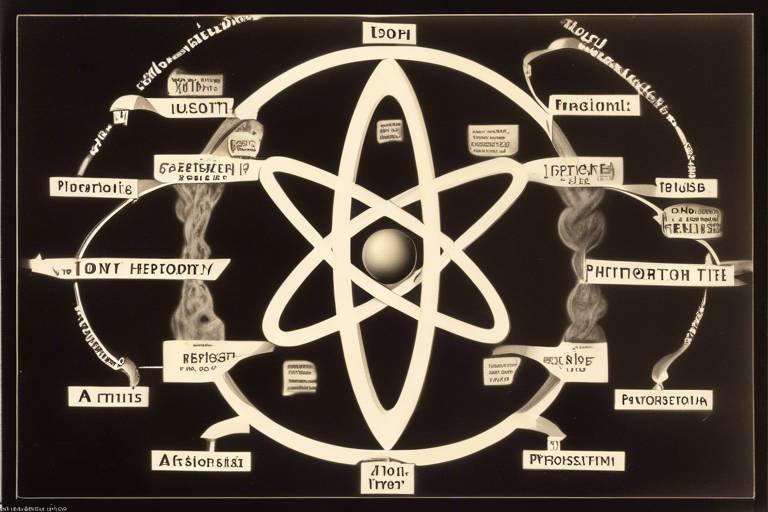The Romanticism and Enlightenment of Philosophy in Science
This article explores the interplay between Romanticism and Enlightenment in the realm of philosophy and science, highlighting key thinkers, concepts, and their lasting impact on modern scientific thought. The journey through these two influential movements reveals not just a historical narrative but a vibrant tapestry of ideas that continue to shape our understanding of the world today. Imagine walking through a lush forest, where the rational paths of Enlightenment thinkers intertwine with the wild, emotional streams of Romanticism—each step revealing new insights and perspectives.
Romanticism emerged as a reaction against the cold, hard logic of Enlightenment rationalism. It was a movement that celebrated the emotional, the natural, and the individual. Picture a world where the heart reigns supreme over the mind, where the beauty of a sunset or the sound of a river can evoke feelings deeper than any mathematical equation. This section delves into the historical context of Romanticism, tracing its roots back to the late 18th and early 19th centuries. It was a time when artists, poets, and philosophers sought to reclaim the emotional depth that they felt was lost in the rationalist discourse of the Enlightenment.
The Enlightenment introduced pivotal thinkers like Kant, Voltaire, and Rousseau, who championed reason and empiricism. Their ideas laid the groundwork for modern scientific inquiry and philosophical discourse. Kant's critical philosophy challenged us to think about the limits of our understanding, while Voltaire's wit and advocacy for civil liberties encouraged a questioning spirit. Rousseau, on the other hand, brought forth the notion of the 'noble savage,' emphasizing the importance of emotion and nature, thus foreshadowing some of the Romantic ideals. Together, these thinkers forged a path that would influence countless generations.
A critical examination of the debate between rationalism and empiricism during the Enlightenment reveals a fascinating clash of ideas. Rationalists like Descartes believed that reason was the primary source of knowledge, while empiricists like Locke argued that experience and observation were fundamental. This tug-of-war between thought and experience shaped scientific methodology and the pursuit of knowledge, creating a rich dialogue that still resonates today. It's akin to a dance where the partners—reason and experience—continuously step on each other's toes, yet somehow manage to create a beautiful performance.
René Descartes' philosophy emphasized reason as the primary source of knowledge. His famous dictum, "I think, therefore I am," encapsulates the essence of rationalism. Descartes contributed significantly to mathematics and science, laying the groundwork for the scientific method. His analytical approach encouraged thinkers to dissect problems logically, paving the way for advancements in various fields. Imagine a mathematician, meticulously solving a complex equation, where each step is guided by reason and clarity—this was Descartes' legacy.
In contrast, John Locke's ideas on experience and observation as the foundation of knowledge challenged the rationalist perspective. Locke believed that the mind is a blank slate at birth, and knowledge is built through sensory experiences. This concept not only influenced scientific methods but also sparked educational reforms during the Enlightenment. Picture a child exploring the world around them, learning through touch, sight, and sound—this experiential learning was at the heart of Locke's philosophy.
Romanticism's emphasis on emotion and nature significantly influenced scientific inquiry. Romantic thinkers integrated artistic expression and personal experience into the scientific discourse of their time. They believed that understanding the world required more than just rational thought; it demanded a deep connection with nature and an appreciation for the emotional experiences that shape human perception. Imagine a scientist standing in a field, not just observing the flowers but feeling their beauty and intricacy—this holistic approach enriched scientific exploration.
The convergence of Romanticism and Enlightenment ideas led to a unique philosophical landscape. This interaction created a fertile ground for new theories and methodologies, blending the rigorous analysis of the Enlightenment with the emotional depth of Romanticism. The result was a more comprehensive understanding of science, one that acknowledged both the rational and the emotional aspects of human experience. It’s like mixing two vibrant colors on a painter's palette, resulting in a shade that is richer and more complex than either could achieve alone.
The legacy of Romanticism and Enlightenment continues to resonate in contemporary science. The philosophical debates from these eras inform current scientific practices and ethical considerations. Today, scientists grapple with questions that blend empirical data with ethical dilemmas, reflecting the ongoing dialogue between reason and emotion. For instance, the field of environmental science often requires a balance between rational policy-making and an emotional connection to nature. This synthesis is crucial as we navigate the challenges of our time.
As science continues to evolve, the philosophical implications of Romanticism and Enlightenment remain relevant. The ongoing relationship between philosophy and science encourages us to ask deeper questions about our understanding of the universe. What does it mean to truly know something? How do our emotions shape our scientific endeavors? These questions will guide future inquiries, ensuring that the legacy of these two movements lives on in our quest for knowledge.
- What is the main difference between Romanticism and Enlightenment?
Romanticism focuses on emotion and individual experience, while Enlightenment emphasizes reason and empirical evidence. - How did Enlightenment thinkers influence modern science?
They laid the groundwork for scientific inquiry through the promotion of reason, skepticism, and empirical methods. - Can we see the influence of Romanticism in today's science?
Yes, many scientific fields now incorporate emotional and ethical considerations, reflecting a blend of both movements.

The Roots of Romanticism
Romanticism emerged as a vibrant movement in the late 18th and early 19th centuries, acting as a counterbalance to the cold, hard rationalism of the Enlightenment. It was a time when the world was awakening to the beauty of emotion, the wonders of nature, and the significance of individual experience. Imagine a world where the heart reigns supreme over the intellect—a world where feelings and personal connections take center stage. This was the essence of Romanticism, which sought to embrace the complexities of human experience that Enlightenment thinkers often overlooked.
The historical context of Romanticism is crucial to understanding its foundations. Emerging in the wake of the Industrial Revolution, Romantic thinkers were often disillusioned by the mechanization of life and the prioritization of reason above all else. They believed that the rapid advancements in science and industry stripped away the human element from life, reducing individuals to mere cogs in a vast machine. In response, Romanticism championed the idea that emotion and nature were vital to understanding the human experience. It was a call to return to the roots of what it meant to be human, to feel deeply, and to connect with the world around us.
Romanticism placed a strong emphasis on the sublime, a concept that refers to the overwhelming beauty and grandeur of nature that can evoke powerful feelings of awe and inspiration. Think of standing on the edge of a towering cliff, gazing at the vast ocean below, and feeling both insignificant and profoundly connected to something greater than yourself. This sense of the sublime is a hallmark of Romantic thought, encouraging individuals to seek out experiences that transcend the mundane and tap into the deeper mysteries of existence.
Key figures in the Romantic movement, such as William Wordsworth, Samuel Taylor Coleridge, and Mary Shelley, explored themes of nature, emotion, and individualism in their works. They believed that art and literature should reflect the richness of human experience, advocating for a more holistic approach to understanding the world. Their writings often celebrated the beauty of the natural world and the depths of human emotion, serving as a reminder that life is not just about logic and reason, but also about feelings and connections.
In the context of science, Romanticism encouraged a more integrated approach, where scientific inquiry was not merely about empirical data and rational thought but also about the personal experiences of the scientists themselves. This shift allowed for a more nuanced understanding of scientific phenomena, blending the objective and the subjective into a cohesive whole. For instance, the works of scientists like Alexander von Humboldt and Charles Darwin reflected this interplay, as they incorporated their observations of nature and personal reflections into their scientific endeavors.
Ultimately, the roots of Romanticism lie in a deep-seated desire to reconnect with the human spirit and the natural world. It was a movement that sought to remind us that while reason and logic are essential, they are not the only pathways to knowledge. By embracing emotion, nature, and individual experience, Romanticism laid the groundwork for a more comprehensive understanding of both philosophy and science, paving the way for future thinkers to explore the intricate dance between heart and mind.
- What is Romanticism? Romanticism is a cultural movement that emerged in the late 18th century, emphasizing emotion, nature, and individual experience as a response to Enlightenment rationalism.
- Who were key figures in the Romantic movement? Notable figures include William Wordsworth, Samuel Taylor Coleridge, and Mary Shelley, who explored themes of nature and emotion in their works.
- How did Romanticism influence science? Romanticism encouraged scientists to integrate personal experiences and emotions into their scientific inquiries, leading to a more holistic understanding of natural phenomena.

The Enlightenment was a remarkable period that reshaped the landscape of philosophy and science, giving rise to **pivotal thinkers** who championed the power of reason and empirical evidence. Among these luminaries, figures like Immanuel Kant, Voltaire, and Jean-Jacques Rousseau stand out for their profound contributions that not only questioned existing norms but also laid the groundwork for modern scientific inquiry and philosophical discourse. Their ideas challenged traditional beliefs and encouraged a culture of questioning and exploration that is still relevant today.
Immanuel Kant, often regarded as a cornerstone of Enlightenment thought, proposed that human understanding is shaped by our experiences. His critical philosophy emphasized the importance of reason while also acknowledging the limitations of human perception. Kant's work, particularly in his seminal text Critique of Pure Reason, argued that while we can never fully grasp the things-in-themselves, our experiences are structured by innate concepts of space and time. This synthesis of rationalism and empiricism paved the way for future philosophical and scientific inquiry.
Then there's Voltaire, whose sharp wit and relentless criticism of religious dogma and political tyranny made him a key figure in the Enlightenment. He believed in the power of reason to challenge superstition and promote tolerance. His advocacy for civil liberties, such as freedom of speech and separation of church and state, resonated deeply with the ideals of the Enlightenment. Voltaire's famous quip, "I disapprove of what you say, but I will defend to the death your right to say it," encapsulates the spirit of intellectual freedom that he championed.
Jean-Jacques Rousseau added a different flavor to Enlightenment thought, focusing on the importance of emotion and the innate goodness of humanity. His work, The Social Contract, argued for the idea of a general will and the importance of collective governance, emphasizing that legitimate political authority relies on the consent of the governed. Rousseau's ideas about education and the development of the individual were revolutionary, influencing both political theory and the emerging field of psychology.
To understand their impact more clearly, here's a brief overview of their contributions:
| Thinker | Key Contributions | Influence on Science |
|---|---|---|
| Immanuel Kant | Critique of Pure Reason, synthesis of rationalism and empiricism | Influenced epistemology and the philosophy of science |
| Voltaire | Advocated for civil liberties and freedom of speech | Promoted critical thinking in scientific and philosophical discourse |
| Jean-Jacques Rousseau | The Social Contract, ideas on education and collective governance | Influenced social sciences and educational reforms |
These thinkers not only shaped the intellectual climate of their time but also set the stage for the scientific revolution that followed. Their emphasis on reason, observation, and individual rights created a fertile ground for the emergence of modern scientific thought. As we delve deeper into the Enlightenment's legacy, it becomes evident that the ideas of these key figures continue to echo in today's scientific practices, encouraging a spirit of inquiry that is essential for progress.
- What was the main focus of the Enlightenment? The Enlightenment emphasized reason, individualism, and skepticism of traditional authority.
- How did Enlightenment thinkers influence modern science? They promoted empirical evidence and rational thought, which are fundamental to scientific inquiry today.
- Who are some other notable Enlightenment thinkers? In addition to Kant, Voltaire, and Rousseau, figures like John Locke and David Hume also made significant contributions.

Rationalism vs. Empiricism
The debate between rationalism and empiricism is one of the most significant philosophical discussions to emerge from the Enlightenment period. At its core, rationalism asserts that reason and innate knowledge are the primary sources of understanding the world, while empiricism emphasizes sensory experience and observation as the foundation of knowledge. This clash of ideas not only shaped philosophical discourse but also laid the groundwork for modern scientific methodologies.
Rationalists, like René Descartes, believed that through the use of reason, individuals could arrive at fundamental truths about existence. Descartes famously stated, “Cogito, ergo sum” or “I think, therefore I am,” suggesting that the act of thinking is proof of one's existence and a starting point for knowledge. In contrast, empiricists such as John Locke argued that the mind is a blank slate at birth, and all knowledge is derived from experience. Locke's assertion that knowledge comes from sensory experiences challenged the rationalist view by emphasizing that observation is crucial for understanding the world.
This philosophical tug-of-war led to a variety of implications for scientific inquiry. For instance, the rationalist approach often favored mathematical models and theoretical frameworks, while empiricism pushed for experimentation and observation as key components of scientific practice. The following table summarizes the key differences between these two schools of thought:
| Aspect | Rationalism | Empiricism |
|---|---|---|
| Source of Knowledge | Innate ideas and reason | Sensory experience and observation |
| Key Thinkers | René Descartes, Baruch Spinoza | John Locke, David Hume |
| Methodology | Theoretical deduction | Inductive reasoning and experimentation |
As the Enlightenment progressed, the interplay between these two philosophical perspectives became increasingly evident in scientific practices. Rationalists sought to create universal laws through logical deduction, while empiricists emphasized the importance of testing and validating those laws through experiments. This dynamic interaction fostered a richer understanding of the natural world, leading to groundbreaking discoveries and advancements in various scientific fields.
Ultimately, the tension between rationalism and empiricism has not only shaped the history of philosophy but also continues to influence contemporary scientific thought. The ongoing dialogue between these two approaches encourages a more holistic view of knowledge, where both reason and experience play vital roles in the quest for understanding. As we navigate the complexities of modern science, recognizing the contributions of both rationalism and empiricism is crucial for fostering innovation and ethical inquiry.
- What is rationalism? Rationalism is a philosophical belief that reason and innate knowledge are the primary sources of understanding the world.
- What is empiricism? Empiricism posits that sensory experience and observation are the foundations of knowledge.
- Who are key thinkers in rationalism? Key thinkers include René Descartes and Baruch Spinoza.
- Who are key thinkers in empiricism? Important figures in empiricism include John Locke and David Hume.
- How do rationalism and empiricism influence modern science? Both philosophies contribute to scientific inquiry by emphasizing the importance of reason and observation in understanding the natural world.

Descartes and Rationalism
René Descartes, often hailed as the father of modern philosophy, made significant contributions that shaped the course of rationalist thought in the Enlightenment. His famous declaration, "Cogito, ergo sum" (I think, therefore I am), encapsulates his belief that the act of thinking is the foundation of all knowledge. Descartes argued that reason is the primary source of knowledge, setting the stage for a philosophical revolution that emphasized logical deduction and mathematical precision over sensory experience.
At the heart of Descartes' philosophy lies the concept of methodical doubt. He believed that in order to arrive at true knowledge, one must first doubt everything that can possibly be doubted. This radical skepticism led him to discard all beliefs that were not absolutely certain. By doing so, he sought to establish a reliable framework for knowledge that was immune to the uncertainties of the senses. Descartes' method involved a systematic approach to questioning and analyzing beliefs, which has influenced not only philosophy but also the scientific method itself.
Descartes' contributions to mathematics and science are equally monumental. He introduced the Cartesian coordinate system, which revolutionized geometry and laid the groundwork for calculus. This mathematical innovation allowed scientists to describe physical phenomena in precise terms, bridging the gap between abstract reasoning and empirical observation. His work in mathematics exemplifies how rationalism can lead to concrete advancements in science, demonstrating the power of reason and logic in understanding the natural world.
Moreover, Descartes' dualistic view of reality, which posits a distinction between the mind and the body, has sparked extensive philosophical debate. This mind-body dualism raises questions about consciousness, identity, and the nature of existence itself. It challenges us to consider how our rational thoughts interact with our physical experiences, a theme that resonates throughout the history of philosophy and continues to influence contemporary discussions in cognitive science and psychology.
In summary, Descartes' emphasis on reason and methodical inquiry not only shaped the Enlightenment but also paved the way for modern scientific exploration. His legacy endures in the principles of rationalism, inspiring generations of thinkers to prioritize logical reasoning in their quest for knowledge. As we navigate the complexities of the modern world, we can look back at Descartes as a guiding light, reminding us that the pursuit of truth often begins with a simple act of questioning.
- What is rationalism? Rationalism is a philosophical belief that knowledge is primarily derived from reason and logical deduction rather than sensory experience.
- Who is René Descartes? René Descartes was a French philosopher, mathematician, and scientist, known for his foundational contributions to modern philosophy and mathematics.
- What is the significance of "Cogito, ergo sum"? This phrase signifies Descartes' assertion that the very act of thinking is proof of one's existence and serves as a fundamental element of his philosophy.
- How did Descartes influence modern science? Descartes' emphasis on reason and mathematical precision laid the groundwork for the scientific method, influencing how scientific inquiry is conducted today.

Locke and Empiricism
John Locke, a towering figure of the Enlightenment, fundamentally reshaped our understanding of knowledge through his advocacy for empiricism. Unlike his rationalist counterparts, Locke posited that knowledge originates from experience and observation. His seminal work, "An Essay Concerning Human Understanding," laid the groundwork for modern scientific methods by arguing that the human mind at birth is a blank slate, or tabula rasa, waiting to be filled with knowledge through sensory experiences.
Locke's emphasis on empiricism was revolutionary, challenging the notion that reason alone could lead to understanding the world. He believed that all ideas and concepts stem from our interactions with the environment, which means that experience is the cornerstone of knowledge. This perspective not only influenced philosophy but also had profound implications for the development of scientific inquiry. By advocating that knowledge must be tested and verified through observation, Locke paved the way for a more rigorous approach to science.
To illustrate Locke's principles, consider the following key points about his views on empiricism:
- Experience as the Source of Knowledge: Locke argued that knowledge is acquired through our senses. For instance, we learn about the world by seeing, hearing, and touching.
- Distinction between Primary and Secondary Qualities: He differentiated between primary qualities (like shape and motion) that exist independently of us and secondary qualities (like color and taste) that depend on our perception.
- Impact on Education: Locke’s ideas influenced educational reforms, promoting experiential learning and observation in the learning process.
Locke's empiricism also brought about a significant shift in the way people approached scientific inquiry. Before him, many thinkers relied heavily on deductive reasoning, often leading to conclusions that were not grounded in observable reality. Locke’s insistence on empirical evidence encouraged scientists to conduct experiments and gather data, which became foundational practices in various fields, including biology, chemistry, and physics.
In summary, John Locke's contributions to empiricism not only challenged existing philosophical paradigms but also laid the groundwork for a scientific approach that values observation and experience. His ideas continue to resonate today, reminding us that our understanding of the world is shaped by what we can see, hear, and touch. As we navigate the complexities of modern science, Locke's legacy serves as a guiding principle, urging us to remain grounded in empirical reality.
- What is empiricism? Empiricism is a philosophical theory that asserts that knowledge comes primarily from sensory experience.
- How did Locke's ideas influence modern science? Locke emphasized observation and experimentation, which are foundational to the scientific method used today.
- What is the 'tabula rasa' concept? The 'tabula rasa' concept refers to Locke's idea that individuals are born without built-in mental content, and knowledge is instead derived from experience.

Romanticism's Influence on Science
Romanticism, a movement that flourished in the late 18th and early 19th centuries, profoundly influenced the landscape of science by emphasizing the significance of emotion, nature, and individual experience. While the Enlightenment championed reason and empirical evidence, Romantic thinkers sought to integrate a more holistic understanding of the world, one that acknowledged the subjective human experience. This shift in perspective allowed for a more nuanced approach to scientific inquiry, where the emotional and the rational could coexist.
One of the most notable contributions of Romanticism to science was its insistence on the importance of nature as a source of inspiration and knowledge. Romantic scientists like Alexander von Humboldt explored the interconnectedness of nature, emphasizing that scientific inquiry should not merely be about quantitative measurements but also about understanding the beauty and complexity of the natural world. Humboldt's expeditions and meticulous observations laid the groundwork for modern ecology, demonstrating how a sense of wonder could fuel scientific discovery.
Furthermore, Romanticism encouraged scientists to embrace their passions and intuitions. Figures such as Mary Shelley, through her iconic novel "Frankenstein," illustrated the potential consequences of unchecked scientific ambition, prompting a critical examination of ethical considerations in scientific practices. This narrative not only highlighted the moral dilemmas faced by scientists but also served as a reminder that emotional and ethical dimensions should be integral to scientific discourse.
The Romantic movement also paved the way for a more interdisciplinary approach to knowledge. Artists, writers, and scientists began to collaborate, sharing insights that blurred the lines between disciplines. For example, the works of poets like William Wordsworth and scientists like Charles Darwin reflected a shared appreciation for the natural world, showcasing how literature and science could inform and enrich one another. This synergy fostered a more comprehensive understanding of human existence and the universe.
In essence, Romanticism's influence on science was about breaking free from the rigid constraints of Enlightenment rationalism. It encouraged a more dynamic and flexible approach to inquiry, one that recognized the importance of the human experience in the pursuit of knowledge. As we continue to navigate the complexities of modern science, the lessons learned from Romantic thinkers remind us that emotion and intuition are just as vital as logic and reason in shaping our understanding of the world.
As we reflect on the interplay between Romanticism and science, it's essential to recognize that this relationship is not merely historical. The echoes of Romantic thought can still be heard in contemporary scientific practices, where researchers increasingly acknowledge the value of creativity and personal insight in their work. This ongoing dialogue between emotion and reason continues to enrich the scientific enterprise, reminding us that the pursuit of knowledge is as much about the heart as it is about the mind.
- What is Romanticism in the context of science?
Romanticism in science refers to a movement that emphasized emotion, nature, and individual experience as crucial elements in scientific inquiry, contrasting with the rationalism of the Enlightenment. - How did Romantic thinkers influence scientific methodology?
Romantic thinkers encouraged a more holistic approach to science, integrating personal experience and emotional insight alongside empirical evidence, which fostered a more interdisciplinary understanding of knowledge. - Can we see the impact of Romanticism in modern science?
Yes, the influence of Romanticism persists today, as many scientists recognize the importance of creativity and ethical considerations in their work, blending emotional and rational perspectives in their research.

The Synthesis of Ideas
The convergence of Romanticism and Enlightenment philosophies created a rich tapestry of thought that profoundly influenced the development of modern scientific theories and methodologies. Imagine a world where the cold, hard logic of reason meets the warm embrace of human emotion; this is where the beauty of scientific inquiry truly flourished. The Enlightenment, with its emphasis on reason and empirical evidence, laid down the groundwork for rigorous scientific methods, while Romanticism infused these methods with a sense of wonder and exploration of the human experience. Together, they crafted a philosophical landscape that encouraged scientists to not only seek knowledge but to also understand the emotional and aesthetic dimensions of their discoveries.
During this synthesis, key themes emerged that shaped the trajectory of science. For instance, the recognition that scientific inquiry is not just a sterile process of data collection, but a deeply human endeavor filled with curiosity and passion. Romantic thinkers like William Wordsworth and Samuel Taylor Coleridge celebrated the natural world, urging scientists to consider the emotional connections people have with nature. This shift in perspective encouraged scientists to approach their work with a sense of reverence for the complexities of the universe.
Moreover, the integration of artistic expression into scientific discourse allowed for a more holistic understanding of the world. The Romantic emphasis on individual experience and intuition pushed scientists to value personal insights alongside empirical data. For example, the works of Charles Darwin reflect this synthesis; his groundbreaking theory of evolution was not just a product of meticulous observation but also of profound reflection on the interconnectedness of life and nature.
As we delve deeper into this synthesis, it's essential to recognize the impact of these intertwined philosophies on modern scientific practices. The legacy of Romanticism and Enlightenment can be seen in various fields, from psychology to environmental science. In psychology, the acknowledgment of emotional and subjective experiences complements the empirical methods established during the Enlightenment. In environmental science, the Romantic appreciation for nature drives contemporary discussions about conservation and sustainability.
To illustrate this synthesis, consider the following table that highlights the key contributions of both movements and their impact on modern science:
| Philosophical Movement | Key Contributions | Impact on Modern Science |
|---|---|---|
| Enlightenment | Emphasis on reason, empiricism, and scientific method | Foundation for modern scientific inquiry and methodology |
| Romanticism | Focus on emotion, nature, and individual experience | Encouragement of holistic approaches in scientific research |
In conclusion, the synthesis of Romanticism and Enlightenment philosophies not only enriched scientific inquiry but also provided a framework for understanding the complexities of the world we inhabit. As we move forward, this blend of reason and emotion will continue to inspire future generations of scientists and philosophers alike, reminding us that the quest for knowledge is as much about the heart as it is about the mind.
- What is the main difference between Romanticism and Enlightenment?
Romanticism emphasizes emotion and individual experience, while Enlightenment focuses on reason and empirical evidence. - How did Romanticism influence scientific inquiry?
Romanticism encouraged scientists to integrate personal experience and emotional connections with nature into their research. - Can we see the impact of these philosophies in modern science?
Yes, the legacy of both movements is evident in fields like psychology and environmental science, where both empirical methods and emotional insights are valued.

Impact on Modern Science
The legacy of Romanticism and Enlightenment continues to resonate profoundly in contemporary science. These two philosophical movements, while seemingly opposed, have woven a rich tapestry that informs the way we approach scientific inquiry today. The Enlightenment, with its emphasis on reason and empirical evidence, laid the groundwork for the scientific method that we still utilize. However, the Romantic movement introduced a vital counterbalance, reminding us that science is not just about cold hard facts but also about the human experience, emotions, and the beauty of the natural world.
Take, for instance, the field of environmental science. The Enlightenment's rigorous methodologies allow scientists to gather data and analyze ecosystems with precision. Yet, it is the Romantic notion of nature's intrinsic value that drives the urgency behind conservation efforts. This interplay is evident in the way scientists advocate for sustainable practices, often invoking emotional appeals alongside empirical data to engage the public and policymakers alike.
Moreover, the philosophical debates that emerged during these eras have shaped modern scientific ethics. Issues such as genetic engineering, artificial intelligence, and climate change are not merely technical problems; they are deeply intertwined with ethical considerations that echo Romantic and Enlightenment thought. Scientists today are increasingly recognizing the importance of a holistic approach that considers not only the scientific implications but also the moral and emotional dimensions of their work.
To illustrate this impact, consider the following table that highlights key areas where the influence of Romanticism and Enlightenment can be seen in modern scientific practices:
| Area of Science | Influence of Enlightenment | Influence of Romanticism |
|---|---|---|
| Environmental Science | Empirical data collection and analysis | Emphasis on the emotional value of nature |
| Medical Ethics | Evidence-based practices | Humanistic approaches to patient care |
| Technology and AI | Logical frameworks and algorithms | Consideration of societal impacts and ethical dilemmas |
As we navigate the complexities of modern science, the dialogue between these two philosophical traditions remains crucial. Scientists are increasingly called to not only provide answers but also to engage in discussions about the implications of their discoveries. This synthesis of rational inquiry and emotional intelligence is essential for fostering a more responsible and responsive scientific community.
In conclusion, the impact of Romanticism and Enlightenment on modern science is not just historical; it is a living dialogue that shapes our understanding of the world. By embracing both the analytical rigor of the Enlightenment and the passionate insights of Romanticism, we can cultivate a richer, more nuanced approach to scientific inquiry that honors both the mind and the heart.
- How did Romanticism influence modern scientific thought?
Romanticism emphasized emotion and nature, encouraging scientists to consider the human experience and ethical implications of their work alongside empirical data. - What role did Enlightenment thinkers play in shaping modern science?
Enlightenment thinkers like Kant and Locke laid the foundation for the scientific method, promoting reason and empirical observation as key components of inquiry. - Are Romanticism and Enlightenment still relevant in today's scientific discussions?
Absolutely! The interplay between these philosophies continues to inform debates on ethics, environmental issues, and the societal impacts of scientific advancements.

Philosophical Implications for Future Inquiry
The interplay between Romanticism and Enlightenment has left a profound legacy that continues to shape our understanding of science today. As we look towards the future, the philosophical implications of these two movements become increasingly significant. They challenge us to reconsider the foundations of scientific inquiry and the ethical dimensions of our research practices. In a world where technology evolves at breakneck speed, we must ask ourselves: Are we merely chasing data, or are we also seeking deeper truths?
One of the most pressing implications is the need for a more holistic approach to science. Romantic thinkers emphasized the importance of emotion, intuition, and the subjective experience of the individual. This perspective invites scientists to embrace a more integrated methodology that values both quantitative data and qualitative insights. For instance, when studying climate change, it’s not enough to present statistical models; we must also consider the emotional and cultural narratives that influence public perception and policy decisions. This blending of approaches can lead to more comprehensive solutions that resonate on both scientific and human levels.
Furthermore, the Enlightenment’s emphasis on reason and rationality serves as a reminder that our scientific endeavors should be grounded in ethics. As we advance in fields such as artificial intelligence and biotechnology, the questions we face are not just technical but deeply philosophical. We must navigate the moral landscapes that arise from our discoveries. For example, consider the implications of genetic engineering. While the potential for curing diseases is immense, we must also grapple with ethical dilemmas surrounding consent, identity, and the nature of humanity itself. In this way, the legacies of Romanticism and Enlightenment compel us to engage in ongoing dialogues about the purpose and consequences of our scientific pursuits.
As we venture into the future, we should also be aware of the limitations of our current paradigms. The dichotomy between Romanticism and Enlightenment can sometimes create an artificial divide in how we approach knowledge. Instead of viewing these movements as opposing forces, we can see them as complementary. This synthesis can inspire innovative methodologies that enrich our inquiry. For instance, interdisciplinary collaborations that draw from the arts, humanities, and sciences can foster new ways of thinking about complex problems.
In conclusion, the philosophical implications of Romanticism and Enlightenment invite us to reflect on the nature of knowledge itself. They challenge us to balance reason with emotion, data with narrative, and science with ethics. As we move forward, let us embrace this rich tapestry of thought and continue to explore the depths of inquiry that lie ahead. The future of science is not just about what we discover, but how we choose to interpret and apply that knowledge in a world that is ever-changing.
- What is the main difference between Romanticism and Enlightenment?
Romanticism emphasizes emotion, nature, and individual experience, while Enlightenment focuses on reason, logic, and empirical evidence.
- How do Romanticism and Enlightenment influence modern science?
Both movements encourage a balance between emotional and rational approaches to knowledge, shaping ethical considerations and methodologies in scientific inquiry.
- What are some practical applications of these philosophical ideas in science?
These ideas can lead to interdisciplinary collaborations, a deeper understanding of public perception in scientific issues, and ethical frameworks for emerging technologies.
Frequently Asked Questions
- What is the main difference between Romanticism and Enlightenment?
The main difference lies in their focus; Romanticism emphasizes emotion, nature, and individual experience, while the Enlightenment prioritizes reason, logic, and empirical evidence. Think of it as the heart versus the head—Romanticism invites you to feel deeply, while Enlightenment encourages you to think critically.
- Who were some key thinkers of the Enlightenment?
Key figures include Immanuel Kant, Voltaire, and Jean-Jacques Rousseau. Each of these thinkers contributed significantly to the development of modern philosophy and science, advocating for reason and empirical methods that still influence scientific inquiry today.
- How did Romanticism influence scientific inquiry?
Romanticism brought a fresh perspective to science by integrating artistic expression and personal experience into scientific discourse. This approach encouraged scientists to consider the emotional and aesthetic dimensions of their work, leading to a more holistic understanding of the natural world.
- What is the debate between rationalism and empiricism?
The debate centers on the sources of knowledge. Rationalists, like René Descartes, argue that reason is the primary source, while empiricists, like John Locke, assert that knowledge comes from experience and observation. This ongoing discussion has shaped scientific methodologies and how we approach knowledge acquisition.
- How do Romanticism and Enlightenment ideas influence modern science?
The legacy of these movements continues to resonate in contemporary science, as they inform ethical considerations and the methodologies we use today. The interplay of emotion and reason in scientific inquiry reminds us that science is not just about data but also about human experience and values.
- What are the philosophical implications for future scientific inquiry?
As science evolves, the philosophical discussions rooted in Romanticism and Enlightenment remain relevant. They prompt us to consider not just what we can do with science, but also what we should do, ensuring that ethical considerations guide future scientific endeavors.





